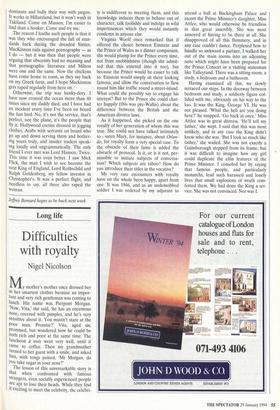Long life
Difficulties with royalty
Nigel Nicolson
My mother's mother once dressed her in her smartest clothes because an impor- tant and very rich gentleman was coming to lunch. His name was Pierpont Morgan. 'Now, Vita,' she said, 'he has an enormous nose, covered with pimples, and he's very sensitive about it. You mustn't stare at the Poor man. Promise?' Vita, aged six, promised, but wondered how he could be both rich and poor at the same time. The luncheon a trois went very well, until it came to coffee. Then my grandmother turned to her guest with a smile, and asked him, with tongs poised, 'Mr Morgan, do you take sugar in your nose?'
The lesson of this unremarkable story is that when confronted with famous strangers, even socially experienced people are apt to lose their heads. While they find it exciting to meet the celebrity, the celebri- ty is indifferent to meeting them, and this knowledge induces them to behave out of character, talk foolishly and indulge in wild impertinences which they would instantly condemn in anyone else.
Virginia Woolf once remarked that if offered the choice between Einstein and the Prince of Wales as a dinner companion, she would plump for the Prince every time, not from snobbishness (though she admit- ted that this entered into it too), but because the Prince would be easier to talk to. Einstein would simply sit there looking famous, and allow the conversation to flow round him like traffic round a street-island. What could she possibly say to engage his interest? But to the Prince she could chat- ter happily (this was pre-Wallis) about the difference between the British and the American divorce laws.
As it happened, she picked on the one royalty of her generation of whom this was true. She could not have talked intimately to 'ueen Mary, for instance, about Orlan- do, for royalty form a very special case. To the obstacle of their fame is added the obstacle of protocol. Is it, or is it not, per- missible to initiate subjects of conversa- tion? Which subjects are taboo? How do you introduce their titles in the vocative?
My very rare encounters with royalty have on the whole been happy, apart from one. It was 1946, and as an undemobbed soldier I was ordered by my adjutant to attend a ball at Buckingham Palace and escort the Prime Minister's daughter, Miss Attlee, who would otherwise be friendless in that great assembly. She was most annoyed at having to be there at all. She disapproved of all this flummery, and in any case couldn't dance. Perplexed how to handle so awkward a partner, I walked her out of the main rooms into an adjoining suite which might have been prepared for the Prince Consort or a visiting statesman like Talleyrand. There was a sitting-room, a study, a bedroom and a bathroom.
Having examined all this, we slowly retraced our steps. In the doorway between bedroom and study, a soldierly figure col- lided with me, obviously on his way to the loo. It was the King, George VI. He was not pleased. 'What the hell are you doing here?' he snapped. 'Go back at once.' Miss Attlee was in great distress. 'He'll tell my father,' she wept. I said that this was most unlikely, and in any case the King didn't know who she was. 'But I look so much like father,' she wailed. She was not exactly a Gainsborough stepped from its frame, but it was difficult to imagine how any girl could duplicate the elfin features of the Prime Minister. I consoled her by saying that famous people, and particularly monarchs, lead such harassed and lonely lives that small explosions of wrath com- forted them. We had done the King a ser- vice. She was not convinced. Nor was I.


































































 Previous page
Previous page